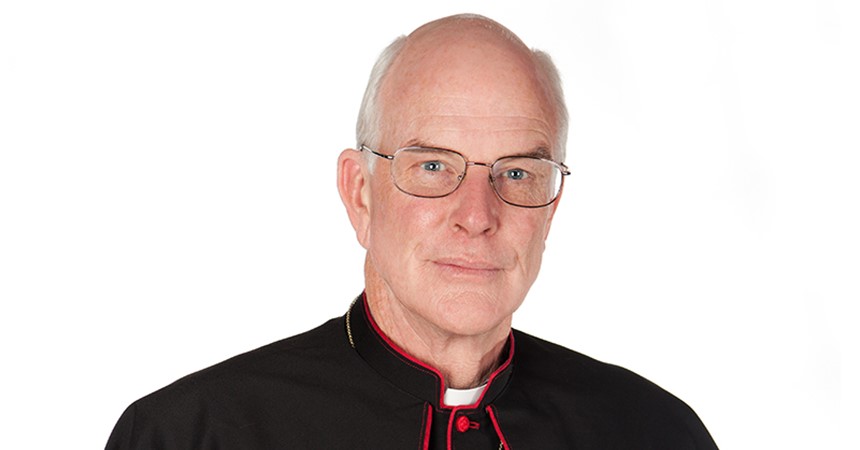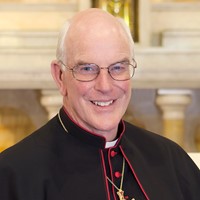When he arrived in 1820, of course, he was no ‘Archpriest’; he was simply the Rev Mr Therry, even the title ‘Father’ for priests in general not yet having come into use. And he was ‘virtually the first’ because he was one of two. The Rev Mr Connolly, however, soon departed for Van Diemen’s Land, the first of a series of clergymen who couldn’t work in close proximity to Therry.
We of the Hunter region especially ought to honour JJ Therry as the founder of the Church in these parts. We know of an early instance of his presence. He had heard that some convicts were to be executed at Maitland and, being refused passage on the government steamer, he set out on horseback. Riding continually through a day and a night, he arrived in Maitland at 5am, said Mass, and took Communion to the prisoners whose hanging he then attended. The church at East Maitland is where it is today because that was where Therry would camp, near the gallows on Stockade Hill, and where he started building the first church in 1830.
Therry also attended convicts and others at Newcastle. There is an 1827 newspaper account of his basing himself there for a couple of weeks, during which he also ventured up the valley. By this time Therry had lost his official position and salary as chaplain, for persistent breaking of the rules. Still, people sent for him and he turned up, or he went searching for his scattered flock. A decade or so later, he gave his new boss, Vicar-General Ullathorne, a tour of the Hunter. Ullathorne later described how they would arrive in a settlement and then spend the day riding around the countryside persuading property owners to allow their convicts or workers to come in to Mass and instruction the next day.
Ullathorne himself was a remarkable man, as evidenced by the fact that he was a boss even Therry more or less respected. Before he came, Therry had first been replaced as official chaplain by a Fr Daniel Power. The two became firm and fast enemies, each dobbing the other in to the government either for dereliction of duty (Power) or for constantly encroaching on the official chaplain’s job (Power on Therry). With the next replacement, Fr Christopher Dowling, Therry got on somewhat better, perhaps because Dowling had the good sense to say, “Right, I’ll work in Sydney, you work out of town” and then resolutely overlooked Therry’s breaches of that agreement.
The fact was, of course, that it was impossible for Fr Therry to be in just one place. The people wanted him everywhere. For years he had been the only priest. The poor, the felons and the aboriginal people knew and loved him. He was their priest, the one who would be dragged across rivers to attend the dying, who would dash up to the gallows at the last moment waving the pardon he had secured from the governor, who would, against all orders, attend the sick in the hospital, marry people without government permission, baptise aboriginal people, write letters to wives in Ireland, lend money. In a prison colony, he was himself offside with the great and the good, so very much like many of his people.
For much of his life, JJ Therry was in trouble. Often the cause was financial. He was forever starting churches and schools, but unable to raise the money to finish them or to account properly for the money already spent. In New South Wales the urbane Ullathorne was quickly able to sort all that out with government assistance, but later Therry spent thirteen years locked in battle with the bishop of Hobart over who was responsible for debts Therry had run up before the bishop came.
For all that, it was notable the greater men of those days did see the qualities in him. Governor Macquarie was one who, for all the problems Therry gave him, supported him rather generously. Ullathorne was another. Fr John McEncroe, another priest with some vision and a bit of the common touch, was his lifelong friend. Bishop Polding preferred to have Therry off in Campbelltown or somewhere remote, doing his own thing, but he did acknowledge what Therry had done for his people in the hard, early days. Caroline Chisholm worked very effectively with him, drawing on his vast knowledge of the people and the needs of the country districts. The petty bureaucrats of Church and state hated Therry’s popularity because it meant they had no chance of exercising any real control over him. The ‘bigger’ figures, though, could see why he was so revered, and learned to live with it.
Anyway, JJ Therry is 150 years dead now. We can take stock. That he was a difficult man to live or work with is clear. Much more important, however, is the record of his unremitting work for the common people, his tireless dedication to those who needed him the most, and his energy and persistence in standing up for his people’s religious and human welfare. He was a remarkable man.

